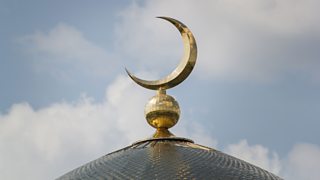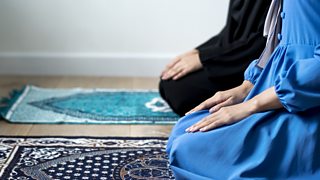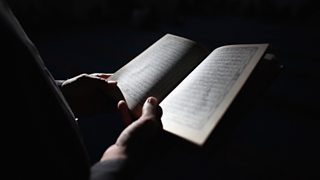A very different Ramadan
In early March of 2020, Britain went into lockdown. As the coronavirus raged, people around the world stocked up on loo rolls, pasta and flour; but for many Muslims their prime concern was that Ramadan was only a few weeks away.
Now Ramadan is here and with Mosques closed and family gatherings banned, the community has had to adapt to a very different Ramadan. Rajeev Gupta reports.
The religious festival of Ramadan is best known for 30 days of strict fasting, which even prohibits drinking water. It’s also a time when members of the Muslim community regularly gather for communal prayers, family Iftars where they break their fasts and observe Zakat – which is giving to charity.
Listen to the programme
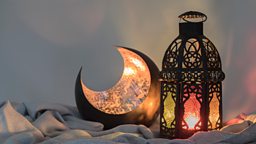
Raees Khan speaks to members of the Muslim community to hear how they plan to carry out Ramadan in a completely different environment.
Jehangir Malik, CEO of the charity Muslim Aid is particularly worried about the impact of Covid-19 on the holiest of Muslim months: “Ramadan is the complete opposite of social-isolation… the truth is that it goes against our very DNA. This month for us, aside from the fasting, is absolutely buzzing. We go out at night and people are gathering for coffees, food – and there is an amazing atmosphere in the community... it’s a blessed month in every way but socialising is part of that.” Maiik feels that without the communal aspect, the festival as most Muslims know it won’t be the same. “My kids have been asking me, 'Dad, what are we going to do for Ramadan?' I just say this year we’re going to have a much more quiet Ramadan. It will be a bit more of a reflective time for us but we will miss the family gatherings.”
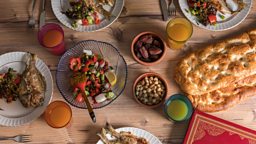
Self-isolation
Imam Irfan Chishti, who has himself been self-isolating after showing symptoms of the virus, sees opportunity in what’s happening this year. “I haven’t been able to hug my children… that been quite nice actually,” he jokes.
Ramadan was never supposed to be about large-scale socialising and feasts.
“On a serious note I know many are feeling bereft that Mosques are closed. But I’m saying to my congregants that actually Ramadan was never supposed to be about large-scale socialising and feasts. Ramadan is supposed to be simple. Muslims should use this time to reflect and get closer to God. This should be a spiritual practice. I hope this year, with what’s happening it may change the focus of what Ramadan has become for some people.”
One of the new practices that’s made its way into everyone’s consciousness along with “social distancing” and washing your hands to "Happy Birthday"… is “self-isolation”. And one thing many people, including many Muslims are unaware of is that Itikaf… a practice in Islam where during the month of Ramadan, a worshipper self-isolates for anything between 10 days and the entire month. During this time they continuously read the Quran with very limited contact from the outside world.
Bano Murtaja, formerly of Blackburn and now living in Canada, was planning to do Itikaf this year but the lockdown has meant she no longer can: “My kids will be home all the time so it’s impossible. I’ve only managed Itikaf once before and that was just before I got married. It was life-changing for me. I had an argument with my brother who I never fought with and so I just wanted to get away. But that time I had with God is something I will forever hold dear. I really miss that. I don’t get as much time as I want with God these days. That’s what Itikaf allows you to do – lock yourself away from the world. You realise that so many things don’t matter any more as much as you thought they did. I remember when it was time for Eid, my parents were like, 'It’s over now…' And I was like, 'No it can’t be. I’m happy here. Leave me alone!',” she laughs.

Lessons for lockdown Ramadan
Muslims reflect on the positive aspects of a self-isolating Ramadan.
Practising GP, Dr Mo Jiva, shares these concerns, “I’ve started to see particularly with people aged over 60 in the community become rapidly isolated. That weekly ritual of all meeting up for Friday prayers isn’t happening and it is having an effect. Clinically I’m worried about the impact it could have on long term mental health.
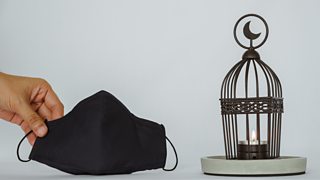
In certain circumstances it is okay for healthcare workers not to fast this year.
Impacting Muslim health professionals
Despite the mosque closing its doors to worshippers, Dr Jiva persuaded his local mosque – the Masjid E Ghosia Mosque in Bolton – to repurpose the venue and make it available to the NHS for palliative care. "We bought in over 20 hospital beds thanks to donations," he explains, "and we could hold up to 50. The idea was that there is an issue with the NHS becoming too stretched and we could help provide relief. As a practising GP, I – with some others in the community – would oversee it." So far the local Clinical Commissioning Group has turned down the Mosque's offer as the local system still has capacity. But Dr Jiva said the Mosque would be happy to donate the beds if they were not needed in future.
The latest statistics on Covid-19 show that BAME communities are being disproportionately affected by it. A significant number of Muslim healthcare workers are among those who have lost their lives. Dr Hina J Shahid, Chair of the Muslim Doctors Association, explains that, in certain circumstances it is okay for healthcare workers not to fast this year. They have to put their health first, she says, and being on the frontline means doctors and nurses are at higher risk. Doing long days on wards without food and water is very difficult, and so people have to see what’s best for them.
Dr Mo Jiva agrees. “It may be those healthcare workers decide to forego their fast until this is all over, or find other ways to manage it, but certainly fasting and trying to operate in the current climate will be tougher than usual.
"My main concern, aside from all of this though is that as a community we keep to the rules. We must carry on social distancing and really avoiding any temptations to meet for congregational prayers. We’ve been doing it well so far so I hope it doesn’t change during Ramadan."
Listen to A Very Different Ramadan on 大象传媒 Radio 4.

Ramadan on 大象传媒 Radio
-
![]()
A Very Different Ramadan
Raees Khan speaks to members of the Muslim community to hear how they plan to carry out Ramadan in a completely different environment.
-
![]()
All your Ramadan questions answered
It is the holiest month in Islam, observed by most of the world's 1.7 billion Muslims.
-
![]()
The challenges of observing Ramadan in lockdown
Dr Hina J Shahid - Chair of the Muslim Doctors Association - suggests how Muslims can overcome the problem.
-
![]()
Ramadan Timetable 2020
Audio clips, videos, features and articles on Ramadan from 大象传媒 Asian Network.

